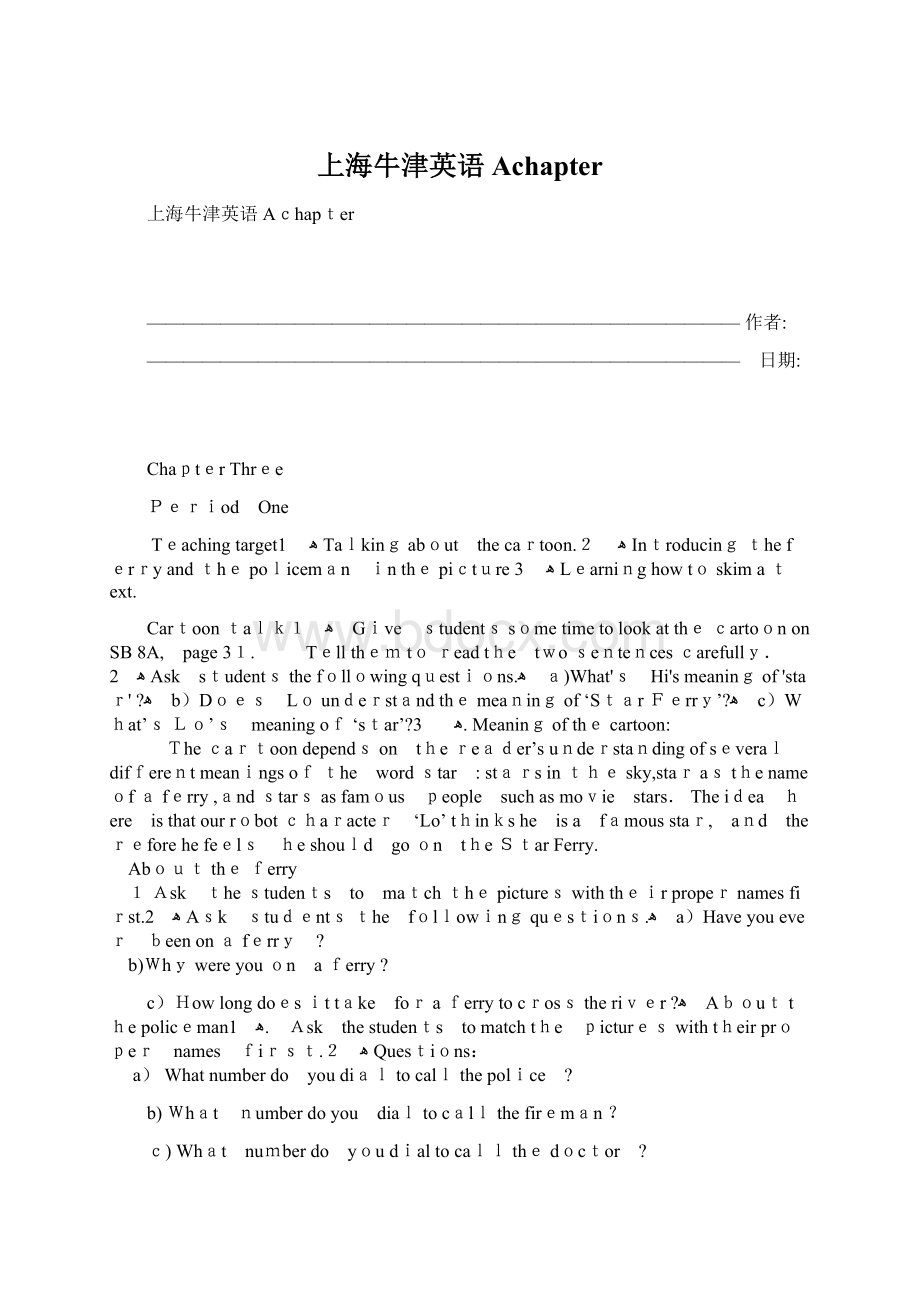上海牛津英语Achapter.docx
《上海牛津英语Achapter.docx》由会员分享,可在线阅读,更多相关《上海牛津英语Achapter.docx(15页珍藏版)》请在冰豆网上搜索。

上海牛津英语Achapter
上海牛津英语Achapter
————————————————————————————————作者:
———————————————————————————————— 日期:
ChapterThree
Period One
Teachingtargetﻫ 1Talkingabout thecartoon.ﻫ 2Introducingtheferryandthepoliceman inthepictureﻫ 3Learninghowtoskimatext.
Cartoontalkﻫ 1 Give studentssometimetolookatthecartoononSB8A, page31. Tellthemtoreadthe twosentencescarefully.ﻫ 2Ask studentsthefollowingquestions.ﻫ a)What's Hi'smeaningof'star'?
ﻫ b)Does Lounderstandthemeaningof‘StarFerry’?
ﻫ c)What’sLo’s meaningof‘star’?
ﻫ 3.Meaningofthecartoon:
Thecartoondependson thereader’sunderstandingofseveraldifferentmeaningsofthe wordstar :
starsinthesky,starasthename ofaferry,andstarsasfamous people suchasmovie stars.Theidea here isthatourrobotcharacter ‘Lo’thinkshe isa famousstar, and thereforehefeels heshould goon theStarFerry.
Abouttheferry
1Ask thestudents to matchthepictureswiththeirpropernamesfirst.ﻫ 2Ask studentsthe followingquestions.ﻫ a)Haveyouever beenonaferry ?
b)Whywereyouon aferry?
c)Howlongdoesittake foraferrytocrosstheriver?
ﻫ Aboutthepolicemanﻫ 1. Ask thestudents tomatchthe pictureswiththeirproper names first.ﻫ 2Questions:
a)Whatnumberdo youdialtocallthepolice ?
b)What numberdoyou dialtocallthefireman?
c)What numberdo youdialtocallthedoctor ?
3.Askstudentsifanyofthem keepadiary.Ifso,askthem iftheywouldliketosayanything aboutthem.Questions:
a)Whatdoyouwriteabout ?
b)Howmuchdo youwrite?
c)How oftendoyou write?
4.Pointoutthedifferencein meaning,pronunciation andspellingbetweendiaryanddairy
5.Readthetitleand thesubtitle onthenextpage.Give shortanswersto these questions
a)Whatisa diary?
b)Whatis thefirstdate inmostdiaries?
c)WhatdoyouthinkPaulwillwriteabout?
6.Lookatthephotos onthenextpage.Giveshort answersto these questions.
a)Whatisthemandoing withthe bag?
b)Which personisPaul?
c)Whichpeoplearearguing?
d)What aretheotherpeopledoing?
PeriodTwo
Teachingtarget
1 Guessthemeaning ofanunknownword byreading awholesentence.
2Learningthenewvocabularyitems inthe passage.
3 Readthepassageandfindthefactsmentionedinit.
ﻫ Preparation
1Student's Book 8A, pages33, 34,
2 Cassette8Aanda cassette player
3 Multi-mediaﻫ 4.Workbook8A,pages
Findthemeanings( AskthestudentstodotheexerciseinCFindthemeanings.Thencheck theanswersorally.)ﻫ Say:
Whenwemeeta newword, wecanoften tellits meaningsbyreadingthe wordsaround it. This ismuchquickerthan lookingitupindictionaries. Pleasereadthe example in CFindthemeaningsonpage34.
Newvocabularyitems (Play thecassette player, askthe studentstolistentothepassage,thenlearnthenewvocabularyitems, showthemthe P.P.T.)
ﻫSay:
let uslearnthemeaning ofthenewvocabularyitems.
1.aboard(adv).[P5]·.onor into aship,boat,aeroplane,busortrain
Becarefulwhenyou stepaboardtheferry.
2.argument(n.)[P1]·A quarrel;anangrydisagreement
The customerwas havinganargumentwithawaiter.
3. deal with [title]·act,behaveinacertainsituation;handleaproblemor person
Police officersoften haveto dealwithdifficultanddangerouspeople.
4.dial(v.)[P8]·selectthenumbersonatelephone;makeaphonecall
Idialed hernumber,but it wasbusy.
5.gate (n.)[P5]·woodenor metalbarrier like adoor,butusuallyin awallorfenceoutsideabuilding.
Thesailoropenedthegates toletpeople walktowardstheferry.
6. handcuffs(n.) [P10]·twostrong metalringswhichpoliceputaroundthewristsofprisoners.
The policeputhandcuffsontheman.Hewasinhandcuffs.
7. hurry(v.) [P5]·moveordo somethingquickly
8. notice(v.)[P4]·see something;tobecome awareof it.
9.purse(n.)]P4]·asmall bagin which we keepmoney.
10.railings (n.) [P9]·metalbars which keepyououtof an area.
Theserailingsstop peoplefromfallingintothesea.
11.report (v.)[P9]·tellsomeonesomething,in anofficialway.
lfthereis anaccident,youmustreportit totheheadmaster.
12.robbery(n.)[P9]·theactofstealingsomething
13.stare(v.)[P2]·look atsomeoneorthing withgreatinterest,withyoureyeswideopen
Some people say thatitisrude tostareatsomeone.
14. steal(v.)[P4]·takesomething whichisnot yours;beathief
15.strange(adj.)[P7]·unusual, puzzling
It’s strangethatMary doesn’twantanice-cream,because she usuallyloves sweetthings.
16.trouble (n.)[title]·aproblemor difficultyofsometype
We’rehavingtroublewithourcar.Itwon’t start.
Synopsisby paragraph(Playthecassetteplayer,askthe studentstoreadafter it, then readthepassagebythemselves,showthemthe secondpicture on page33)
Say:
Canyougive methe mainlyideaofParagraph1?
(P2—4,P5—7,P8—9,P10—11)
(checkthe answersandshow themthe P.P.T.)
Synopsis:
P1:
Pauldescribes how heandhisfathersawamanandtwowomenarguing.
P2-4:
Paul’sfatherspoketooneof thewomen..Shesaidtheman andtwo othermenhadstolenher friend’s purse.
P5-7:
The peoplegetontotheferry, butPaul’sfatherwon’tgeton. Paul can’tunderstand why.
P8-9:
Hisfatherquicklyphonesthe police withallthedetails.
P10-11:
The policemeetthe ferrywhenitarrives andcatchtheman.
Consolidation
1 Copy thenewvocabularyitemsinthisperiod.
2Workbook,sectionsA
3Readthepassagefluently
PeriodThree
Teaching aim:
I.Languagefocus:
The studentswill:
learntousesome importantexpressions from thetext.
tellandwritea story inapasttense.
II.Languageskills:
The studentswill:
findinformationinthe diaryentryandputit intoa differentcontext(aletter)
useinference tosummarizeastory.
describepeople.
III.Emotionalobjective:
Thestudentswill:
developlogical thinking.
have furtherunderstandingofthetwo moralpoints thatmentionedbefore.
Teaching Procedure:
I.Warming-up 2’
a.Introduceapairof humordialogueandguessthemeaning
Q:
What dopeopledoin aclockfactory?
A:
Theymakefacesallday.
b. learnapieceof proverb andreviewthe proverbthatwaslearnedbefore.
II.Reviewingusefulexpressionsfrom thetext. 12’
Task 1.Readandfill intheblanksintheletter.
Task2.Findtheanswers tosomequestionsin Paul’s diary.
Task3. Learnthe usefulexpressionsfromthetext.
Task4.Retell astoryonStudents’PracticeBook
III. Listening 9’
Task 1.Listen andlearnsomeexpressionsto describepeople.
Task 2.Completethedescriptions belowindialogues
Task3.Usethephrasestodescribe somepeople
IV. Supplementarylistening 12’
Task 1.
Listentoget themainidea.
Task2.
Arrange thejumbledsentencesinaproper order
V.Homework
1.Practicebookpage
PeriodFour
Languageand Speaking
Talking aboutthe past
1.Tellstudentswecanusethe simplepasttense totalk aboutthings thathappenedin thepast.
eg.Hereportedtherobbery.
2. Writesomeregularverbs andsentenceson the board andtell studentsallthe verbs inthesentencesbelowarein thesimplepasttense.Askthemhowtoformpasttenseverbs.
visit Ivisited Hongkong last summer.
invent WiburandOrvilleWright inventedtheaeroplane in 1896.
finish Hefinished allhisworkonehourago.
3.Explain thatregularverbsadd–edor –d tobase formtomakethepast tenseform. Point out thatthe simple past tenseisthe sameforallpersons.
Changethe base form intothe pasttenseform:
look/add/call/ play/fail/remember
Practisesayingthree different waysof pronouncingthe pasttenseformsofverbs.
/t/ /d/ /id/
crossed agreed ended
helped apologizedscolded
laughed carriedrecorded
pressed turned lifted
switched used visited
4.Adding–ed/-d tosome verbscausesspellingchanges.
Weonlyadd–dtoverbsthat end in–e,eg.noticed,stared,moved, named.
Wechangethe –yto –Iandadd–edtosomeoftheverbsthatend in–y,eg.carried,hurried.Note:
theverbsplayand enjoyalthoughendingin–y,do notobey therule
Someverbsdoubletheirfinalconsonantswhen –edis added, eg.dailled,stopped.
Many verbs are irregularin form.Wedonotadd–edtothem.Irregularverbshavetobelearntby heart.Wecandividethemintofourdifferentkinds.Herearesomecommonirregular verbs:
Infinitive simplepast past participle
A A A
cost cost cost
put put put
A B A
come came come
run ran run
A B B
buy bought bought
get got got
hear heard heard
leave left left
pay paid paid
say said said
stand stood stood
teach taught taught
A B C
be was/were been
break broke broken
do did done
drive drove driven
fall fell fallen
give gave given
go went gone
know knew known
ring rang rung
see saw seen
speak spoke spoken
steal stole stolen
take took taken
5.Practisesomesentences:
listenandsaythesentences.(SBp41A2 )
practicecontrastingthesimplepastand the simplepresent.Putthe followingchartaboutMaryonthe board.
Ten yearsago Now